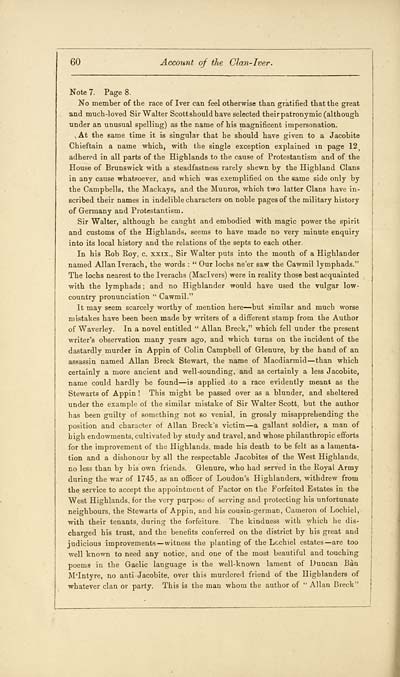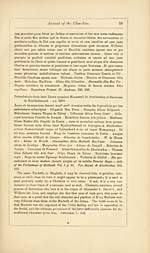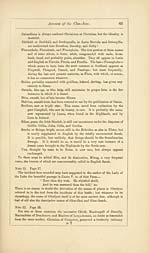Account of the Clan-Iver
(74) Page 60
Download files
Complete book:
Individual page:
Thumbnail gallery: Grid view | List view

60
Account of the Clan-Iver.
Note 7. Page 8.
No member of the race of Iver can feel otherwise than gratified that the great
and much-loved Sir Walter Scottshould have selected theirpatronymic (although
under an unusual spelling) as the name of his magnificent impersonation.
v At the same time it is singular that he should have given to a Jacobite
Chieftain a name which, with the single exception explained in page 12 (
adhered in all parts of the Highlands to the cause of Protestantism and of the
House of Brunswick with a steadfastness rarely shewn by the Highland Clans
in any cause whatsoever, and which was exemplified on the same side only by
the Campbells, the Mackays, and the Munros, which two latter Clans have in-
scribed their names in indelible characters on noble pages of the military history
of Germany and Protestantism.
Sir Walter, although he caught and embodied with magic power the spirit
and customs of the Highlands, seems to have made no very minute enquiry
into its local history and the relations of the septs to each other.
In his Rob Roy, c. xxix., Sir Walter puts into the mouth of a Highlander
named Allan Iverach, the words : " Our lochs ne'er saw the Cawmil lymphads."
The lochs nearest to the Iverachs (Maclvers) were in reality those best acquainted
with the lymphads; and no Highlander would have used the vulgar low-
country pronunciation " Cawmil."
It may seem scarcely worthy of mention here — but similar and much worse
mistakes have been been made by writers of a different stamp from the Author
of Waverley. In a novel entitled " Allan Breck," which fell under the present
writer's observation many years ago, and which turns on the incident of the
dastardly murder in Appin of Colin Campbell of Glenure, by the hand of an
assassin named Allan Breck Stewart, the name of Macdiarmid — than which
certainly a more ancient and well-sounding, and as certainly a less Jacobite,
name could hardly be found — is applied to a race evidently meant as the
Stewarts of Appin ! This might be passed over as a blunder, and sheltered
under the example of the similar mistake of Sir Walter Scott, but the author
has been guilty of something not so venial, in grossly misapprehending the
position and character of Allan Breck's victim — a gallant soldier, a man of
high endowments, cultivated by study and travel, and whose philanthropic efforts
for the improvement of the Highlands, made his death to be felt as a lamenta-
tion and a dishonour by all the respectable Jacobites of the West Highlands,
no less than by bis own friends. Glenure, who had served in the Royal Army
during the war of 1745, as an officer of Loudon's Highlanders, withdrew from
the service to accept the appointment of Factor on the Forfeited Estates in the
West Highlands, for the very purpose of serving and protecting his unfortunate
neighbours, the Stewarts of Appin, and his cousin-german, Cameron of Lochiel,
with their tenants, during the forfeiture. The kindness with which lie dis-
charged bis trust, and the benefits conferred on the district by his great and
judicious improvements — witness the planting of the Lochiel estates — are too
well known to need any notice, and one of the most beautiful and touching
poems in the Gaelic language is the well-known lament of Duncan Ban
M'Intyre, no anti -Jacobite, over this murdered friend of the Highlanders of
whatever clan or party. This is the man whom the author of " Allan Breck"
Account of the Clan-Iver.
Note 7. Page 8.
No member of the race of Iver can feel otherwise than gratified that the great
and much-loved Sir Walter Scottshould have selected theirpatronymic (although
under an unusual spelling) as the name of his magnificent impersonation.
v At the same time it is singular that he should have given to a Jacobite
Chieftain a name which, with the single exception explained in page 12 (
adhered in all parts of the Highlands to the cause of Protestantism and of the
House of Brunswick with a steadfastness rarely shewn by the Highland Clans
in any cause whatsoever, and which was exemplified on the same side only by
the Campbells, the Mackays, and the Munros, which two latter Clans have in-
scribed their names in indelible characters on noble pages of the military history
of Germany and Protestantism.
Sir Walter, although he caught and embodied with magic power the spirit
and customs of the Highlands, seems to have made no very minute enquiry
into its local history and the relations of the septs to each other.
In his Rob Roy, c. xxix., Sir Walter puts into the mouth of a Highlander
named Allan Iverach, the words : " Our lochs ne'er saw the Cawmil lymphads."
The lochs nearest to the Iverachs (Maclvers) were in reality those best acquainted
with the lymphads; and no Highlander would have used the vulgar low-
country pronunciation " Cawmil."
It may seem scarcely worthy of mention here — but similar and much worse
mistakes have been been made by writers of a different stamp from the Author
of Waverley. In a novel entitled " Allan Breck," which fell under the present
writer's observation many years ago, and which turns on the incident of the
dastardly murder in Appin of Colin Campbell of Glenure, by the hand of an
assassin named Allan Breck Stewart, the name of Macdiarmid — than which
certainly a more ancient and well-sounding, and as certainly a less Jacobite,
name could hardly be found — is applied to a race evidently meant as the
Stewarts of Appin ! This might be passed over as a blunder, and sheltered
under the example of the similar mistake of Sir Walter Scott, but the author
has been guilty of something not so venial, in grossly misapprehending the
position and character of Allan Breck's victim — a gallant soldier, a man of
high endowments, cultivated by study and travel, and whose philanthropic efforts
for the improvement of the Highlands, made his death to be felt as a lamenta-
tion and a dishonour by all the respectable Jacobites of the West Highlands,
no less than by bis own friends. Glenure, who had served in the Royal Army
during the war of 1745, as an officer of Loudon's Highlanders, withdrew from
the service to accept the appointment of Factor on the Forfeited Estates in the
West Highlands, for the very purpose of serving and protecting his unfortunate
neighbours, the Stewarts of Appin, and his cousin-german, Cameron of Lochiel,
with their tenants, during the forfeiture. The kindness with which lie dis-
charged bis trust, and the benefits conferred on the district by his great and
judicious improvements — witness the planting of the Lochiel estates — are too
well known to need any notice, and one of the most beautiful and touching
poems in the Gaelic language is the well-known lament of Duncan Ban
M'Intyre, no anti -Jacobite, over this murdered friend of the Highlanders of
whatever clan or party. This is the man whom the author of " Allan Breck"
Set display mode to:
![]() Universal Viewer |
Universal Viewer | ![]() Mirador |
Large image | Transcription
Mirador |
Large image | Transcription
Images and transcriptions on this page, including medium image downloads, may be used under the Creative Commons Attribution 4.0 International Licence unless otherwise stated. ![]()
| Histories of Scottish families > Account of the Clan-Iver > (74) Page 60 |
|---|
| Permanent URL | https://digital.nls.uk/95352755 |
|---|
| Description | A selection of almost 400 printed items relating to the history of Scottish families, mostly dating from the 19th and early 20th centuries. Includes memoirs, genealogies and clan histories, with a few produced by emigrant families. The earliest family history goes back to AD 916. |
|---|

